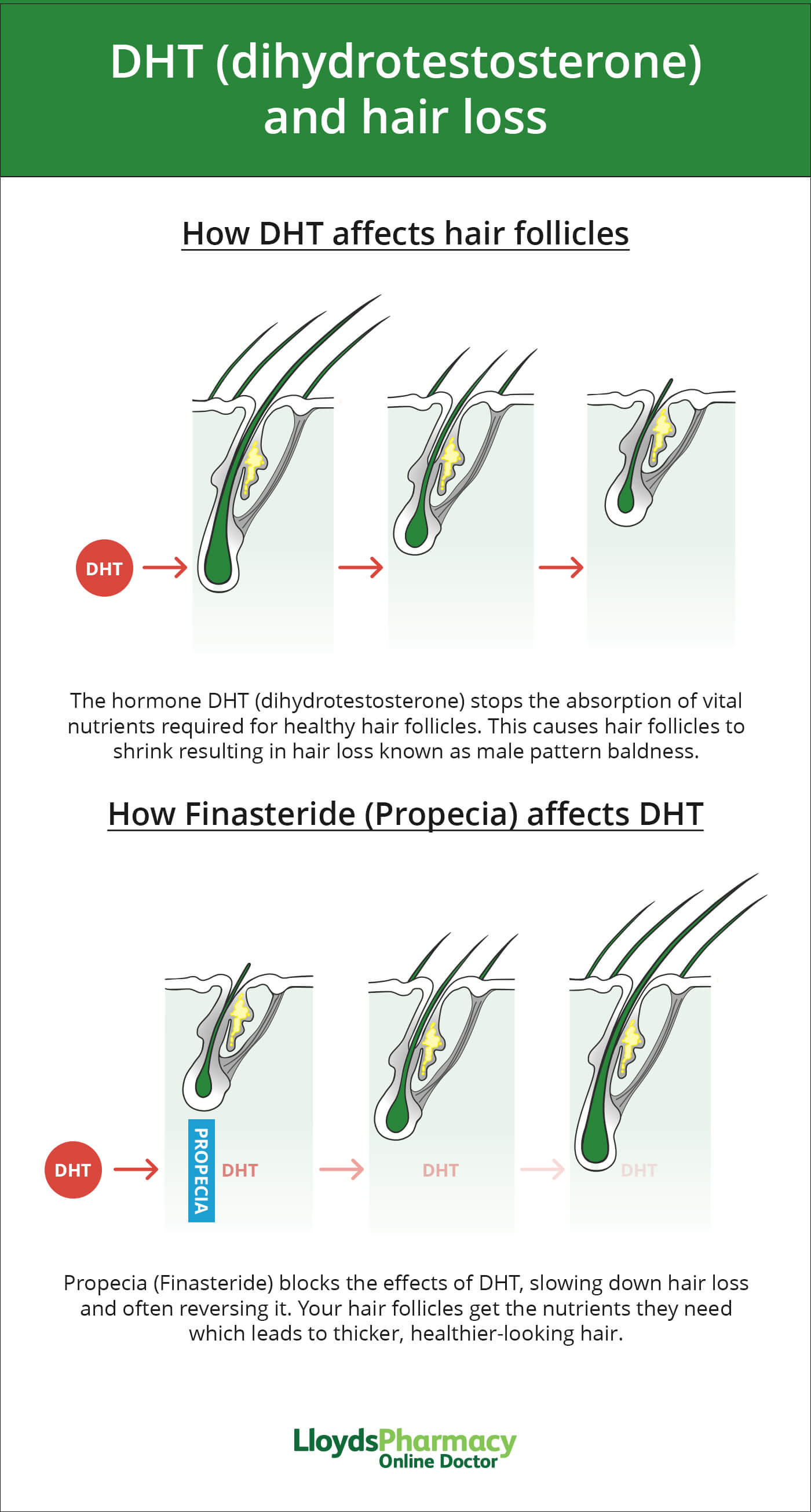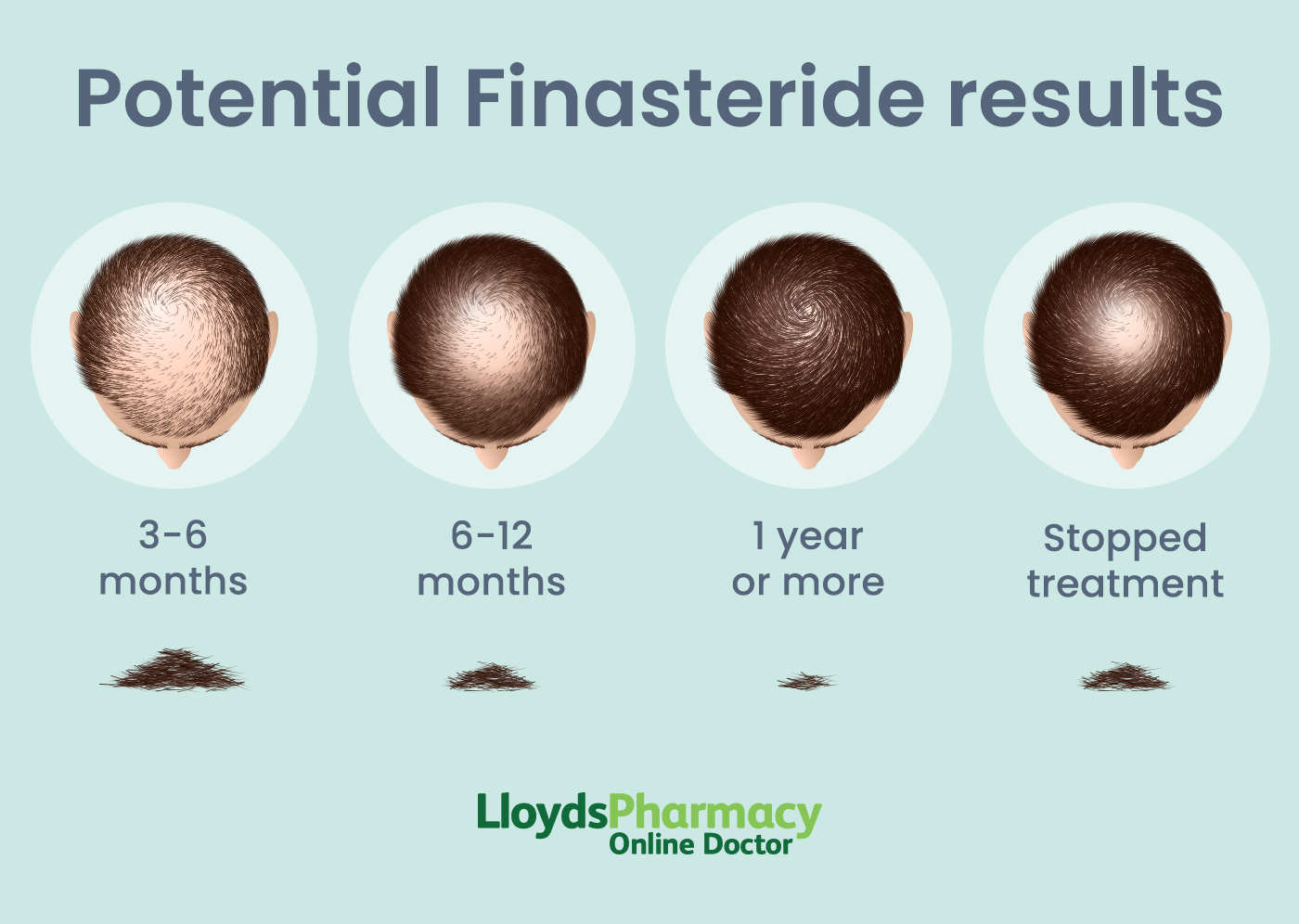Finasteride 1mg Tablets for Hair Loss
What is finasteride?
Finasteride is a generic treatment for hair loss, containing the same active ingredient as the popular branded treatment, Propecia. It is taken daily as a tablet and halts hair loss for as many as 9 out of 10 men. Finasteride only stimulates hair growth on the head and will not cause hair to grow elsewhere on the body.
Finasteride works by preventing the enzyme that turns testosterone into dihydrotestosterone (DHT) from doing so. A reduced amount of DHT in the hair follicles reduces the rate at which hair is lost, and in some cases causes new hair to grow again.
How does finasteride work?
The active ingredient in finasteride (finasteride) blocks the action of an enzyme that converts the male hormone testosterone into dihydrotestosterone (DHT). DHT is the hormone that causes male hair loss.
By reducing the amount of DHT affecting follicles in the scalp, finasteride helps to halt hair loss and, in some cases, reverse hair loss.

Does finasteride regrow hair?
While there isn’t a cure for hair loss, finasteride can help regrow hair and stops hair loss. Around 1 in 3 men taking finasteride will experience hair regrowth. This can take months and varies from person to person. Find out more about how to stop hair loss.
How long does finasteride take to work?
Results won’t be instant. Generally, you will need to take finasteride daily for 3-6 months before you start to see any change in your hair loss. For the majority of men, it will take a few months of daily use, before they start to see the impact. Results won’t appear any quicker if you take more than one tablet a day.
You should continue taking finasteride for at least a year to confirm whether it is effective for you.

How effective is finasteride?
For most men, finasteride takes 3-6 months of daily use to show effects. The active ingredient (finasteride) has been shown to be effective in preventing hair loss in men in 9 out of 10 cases. In some cases, men experience hair regrowth.
Like with most medications, certain treatments may work for some people and not for others. Studies have found that taking finasteride:
- Halts hair loss for 83% of men
- Over 2 years 66% of men will see regrowth
- Over 5 years can help halt hair loss for as many as 90% of men
Finasteride is most effective in men with mild to moderate hair loss on the top of their head caused by male pattern baldness. There is little evidence that it is effective in reversing a receding hairline.
How to take Finasteride
- Take 1 tablet of finasteride each day, with or without food.
- Do not take more than 1 tablet in 24 hours.
- You must continue to take finasteride for the treatment to work.
You will need to continue with your treatment for as long as you would like to slow your hair loss. Once you stop taking finasteride your hair loss will continue.
If you forget to take finasteride, take the next dose as soon as you remember. Do not take a double dose to make up for the forgotten tablet.
How can I maximise the effects of finasteride?
For a majority of cases it will likely be three to six months before you start to see your hair affected by finasteride. However, to maintain your hair’s health and maximise the effects of finasteride it’s helpful to:
- Eat a healthy diet
- Consider using a DHT blocking shampoo
- Maintain vitamin D and biotin levels
- Combine usage with minoxidil
- Take finasteride every day - stopping treatment can lead to losing your new hair
Does finasteride interact with foods or drinks?
According to the NHS, there is no need to change your diet while on finasteride. You should be able to eat and drink normally while you are on this treatment.
What are the side effects of finasteride?
Side effects of finasteride are uncommon and usually mild. If you begin to experience any side effects, please notify your GP. Known side effects of finasteride include:
Uncommon side effects (may affect up to 1 in 100 people)
- Impotence
- Lessened sexual desire
- Erection difficulties
- Problems with ejaculation
Unknown frequency
- Breast swelling or tenderness
- Pain in testes
- Blood in semen
- Heart palpitations
- Persistent erection difficulties and sex drive decrease
- Changes to the way your liver works
- Anxiety and suicidal thoughts
“Very rarely, sexual side effects can be permanent and remain after stopping the medication. If you are experiencing side effects speak to your doctor.” - Dr Bhavini Shah
For full information on side effects and correct use, see the patient information leaflet. If any side effects concern you, contact us via your Patient Record.
Does finasteride cause depression?
Finasteride has been associated with depression, suicidal thoughts, and sexual dysfunction.
Depression may include feelings of low self-esteem, lacking interest in activities and hopelessness. There are also physical symptoms of depression like headaches, tiredness, disturbed sleep patterns.
“If you develop any suicidal thoughts, stop finasteride immediately and seek urgent help from your GP. If you require urgent help call 111/999 or go to A&E” - Dr Bhavini Shah
Managing finasteride side effects
Any side effects you may get as a result of taking finasteride will vary from patient to patient. If you get any side effects or are worried about finasteride side effects please:
- Contact your GP
- Understand some side effects are temporary
- Take finasteride at the same time every day
- Make healthy lifestyle choices (outside of your hair loss treatment)
- Stop using finasteride if you begin to experience severe or dangerous side effects
Who is finasteride suitable for?
Finasteride is used to treat men experiencing male pattern hair loss, who have lost mild to moderate amounts of hair (not complete hair loss). For more information on suitability, consult finasteride's patient information leaflet.
Can women use finasteride?
Finasteride is for male hair loss only and is not suitable for women. Find out more about hair loss treatment for women.





